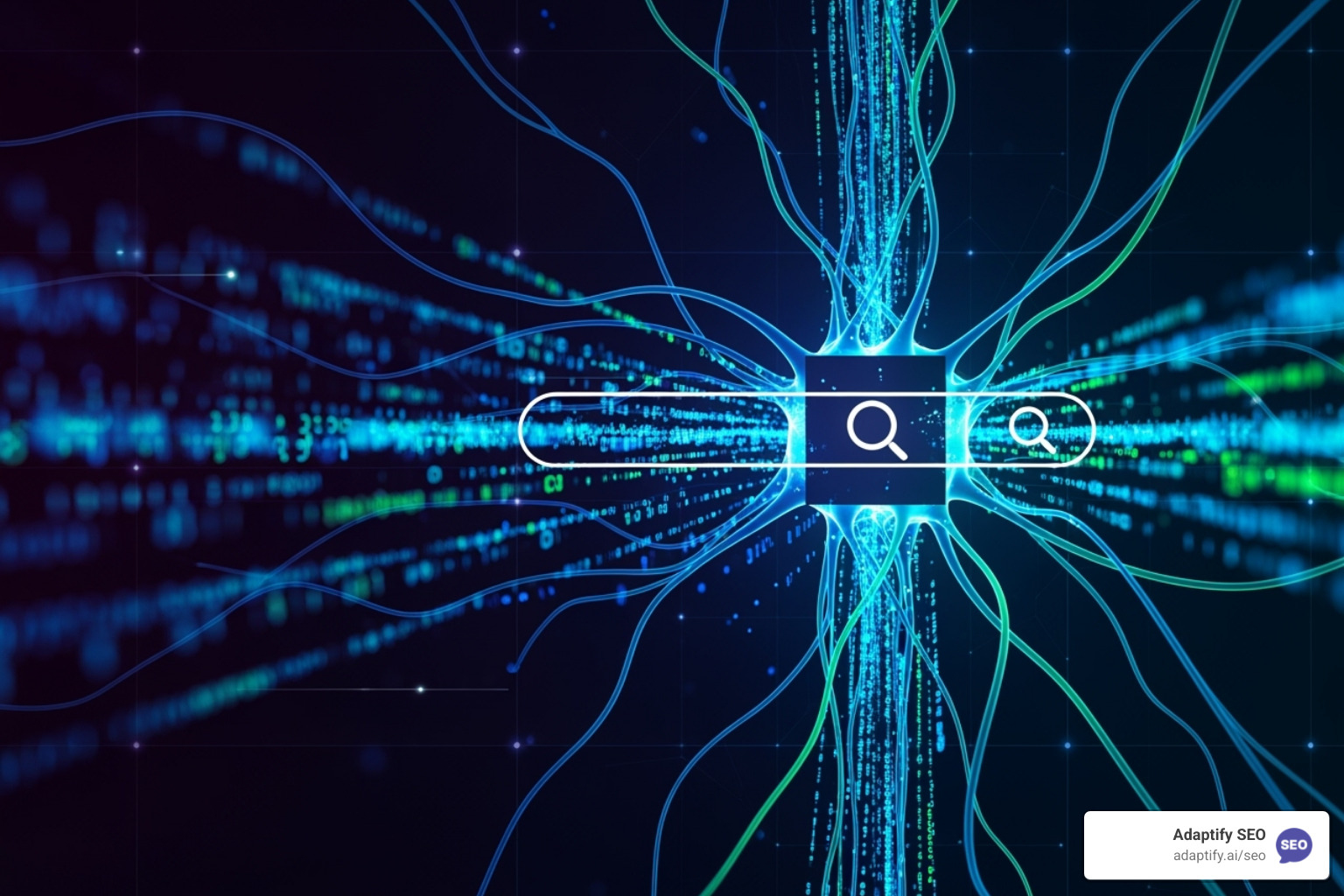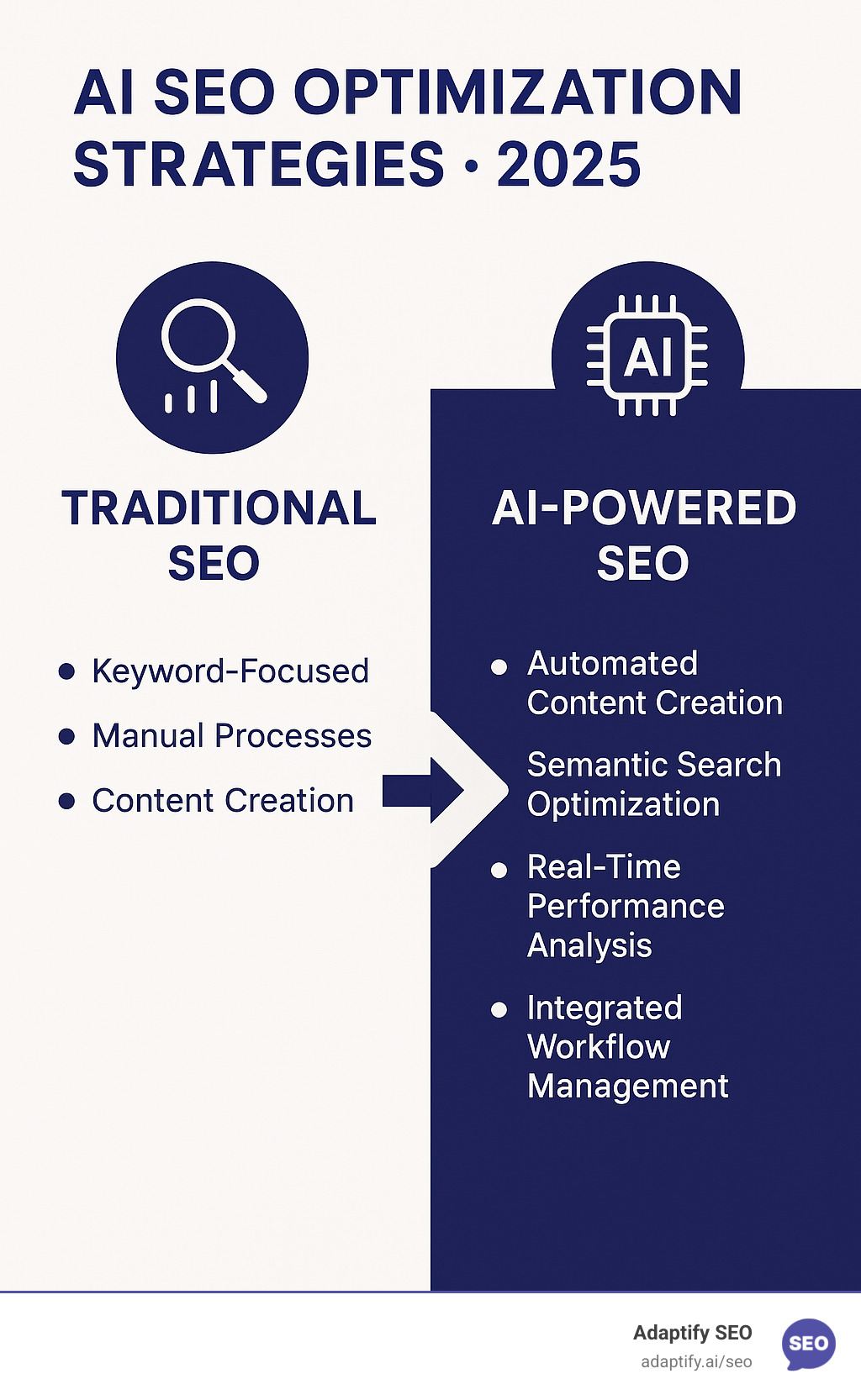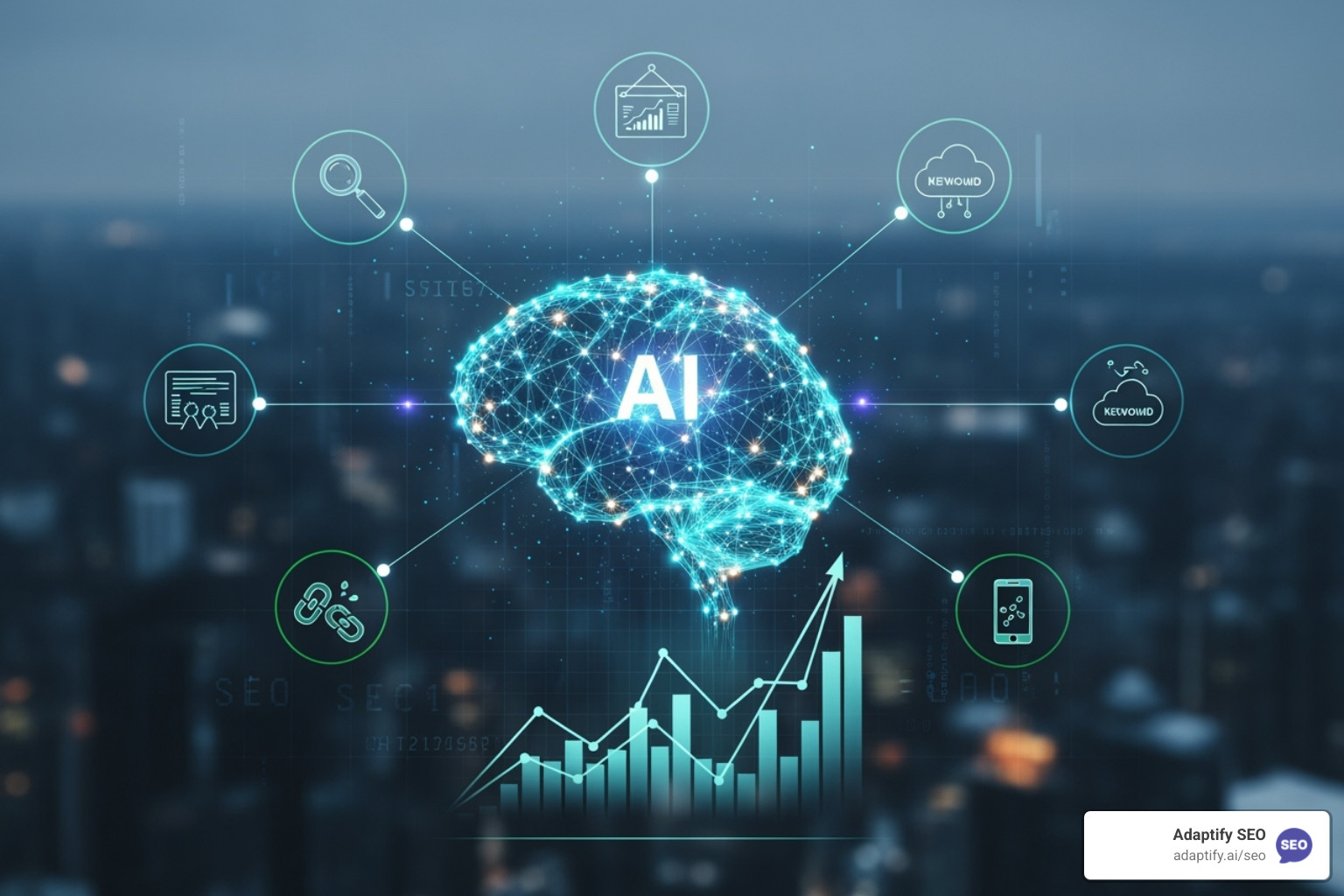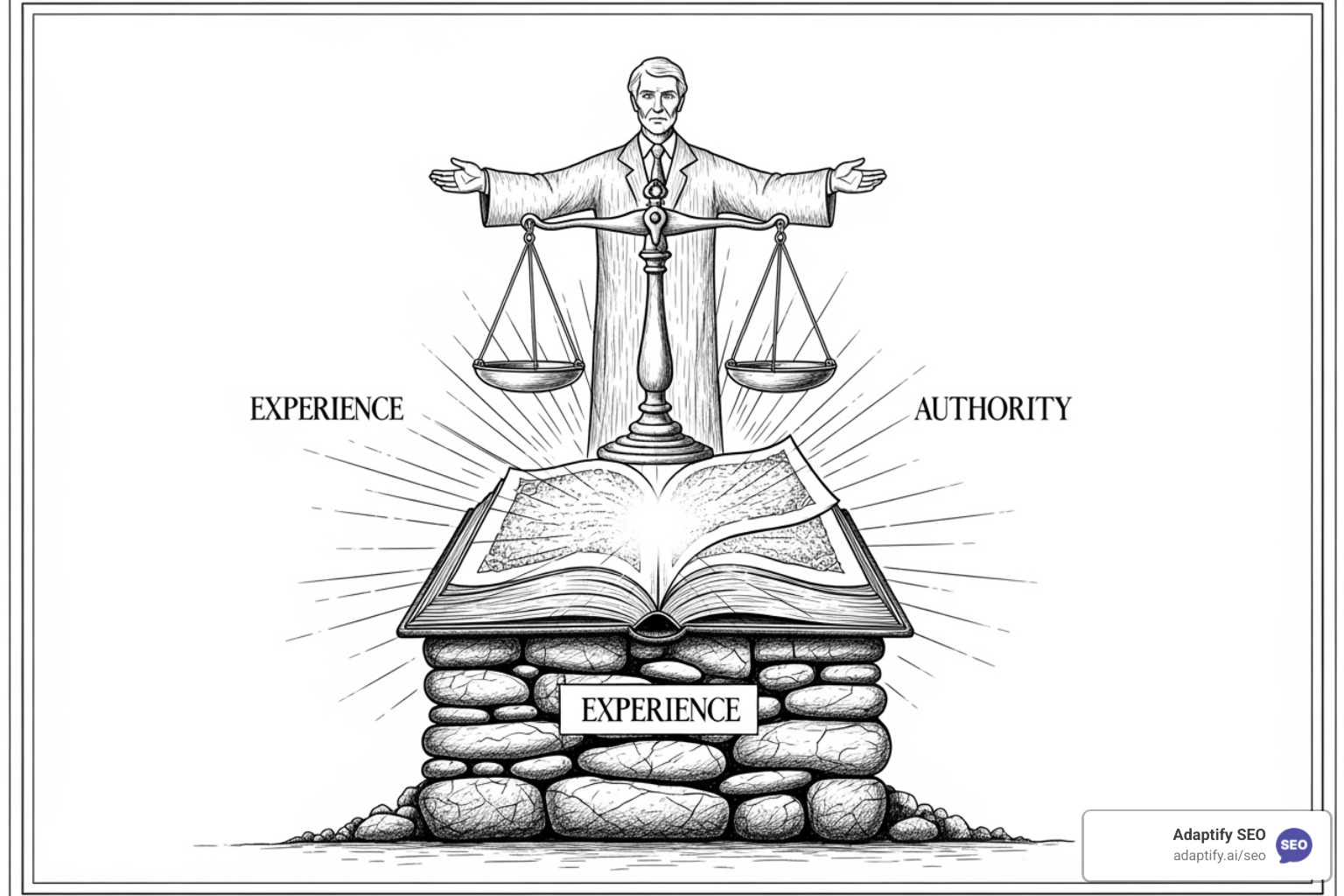Beyond the Bots: Mastering AI SEO for Tomorrow's Search
Hansjan Kamerling
Sep 11
Why AI SEO Optimization Strategies Are Essential for Modern Search Success

AI SEO optimization strategies are revolutionizing search engine optimization by merging artificial intelligence with traditional techniques to automate tasks, refine targeting, and scale content creation. Key applications include:
- Content Creation: Using AI for topic ideation and first drafts with human oversight.
- Keyword Research: Leveraging AI to analyze user intent and predict search trends.
- Technical Optimization: Automating internal linking, schema markup, and site audits.
- Performance Analysis: Applying AI for real-time SERP and competitive gap analysis.
- Authority Building: Using AI for backlink prospecting and content refreshing.
The data is clear: 73% of marketers are expanding their use of SEO solutions, yet 82% struggle to improve organic results with traditional methods. This isn't about replacing human expertise. As one CMO admitted, "Artificial intelligence is impacting our company tremendously, but we don't have enough qualified personnel to fully integrate AI into our marketing strategy." The challenge is strategic adoption, not just tooling.
With Google's Search Generative Experience serving 1.5 billion monthly users and AI engines like Perplexity mirroring Google's top results over 91% of the time, the search landscape is fundamentally changing.
I'm Hansjan Kamerling. I've spent years helping SaaS platforms and AI startups steer these digital shifts, developing AI SEO strategies for companies with millions of users. My experience gives me unique insights into how AI can effectively scale SEO operations.

The Paradigm Shift: From Traditional SEO to AI-Powered Intelligence
Traditional SEO involved manual keyword research and reactive adjustments. Today, we've shifted to proactive AI SEO optimization strategies that process millions of data points, turning guesswork into a science. With 5.9 million Google searches every minute, no human team can manually analyze data at this scale. Machine learning algorithms, however, thrive on it.
AI for SEO is a game-changer, enabling systems to identify user intent patterns, predict trending topics, and optimize content based on real-time data. As search marketing leader Kyle Byers notes, "The future of SEO isn't about replacing human creativity – it's about amplifying it with AI capabilities that can process and act on data at superhuman speed." This shift is also reshaping search results, with zero-click searches becoming more common as users get answers directly on the SERP.
Why AI is Now the Baseline for SEO
The reality is that 82% of marketers find it challenging to improve organic search results with old methods, and 62% feel their tech stack is too complex. Teams often juggle separate tools for keyword research, content, technical audits, and link building, leading to inefficiency.
This is why 73% of marketers plan to expand their SEO solutions, prioritizing AI-integrated platforms that offer system unification. Instead of manually piecing together data from multiple tools, AI connects the dots in real-time, surfacing actionable insights. This provides a dramatic competitive advantage. While some teams manually research keywords, AI-powered teams analyze entire topic clusters and optimize strategies across thousands of pages simultaneously. For agencies with clients in the US, UK, or Australia, AI ensures consistent, data-driven optimization across all time zones.
The New Dynamic: How AI and SEO Work Together
AI doesn't replace SEO professionals; it improves their capabilities. The best AI SEO optimization strategies combine AI's processing power with human creativity and strategic insight. AI handles the heavy lifting—crunching data, identifying technical issues, and spotting content gaps. Humans focus on what they do best: understanding user needs, crafting compelling narratives, and building brand connections.
This human-AI collaboration is the key to success. AI can generate a data-driven content brief, but a human writer adds the resonance. AI can find link opportunities, but a human builds the relationship. As Google's Danny Sullivan says, "AI doesn't change our fundamental advice about creating helpful, reliable, people-first content. It just gives creators more powerful tools to do it at scale."
What AI cannot replicate is empathy in content—the human understanding of an audience's needs and the brand voice that builds trust. Successful strategies use AI for data and optimization, while humans focus on storytelling.
Core AI SEO Optimization Strategies for Sustainable Growth

The shift to AI-powered SEO is practical, not just theoretical. The core areas where AI SEO optimization strategies deliver the biggest impact are content, keywords, link building, and technical SEO. These advanced techniques are now accessible to agencies of all sizes, whether in the US, UK, or Australia.
Revolutionizing Keyword Research and Topic Clustering
AI has transformed keyword research from guesswork into a science of semantic search and user intent analysis. It uncovers high-intent long-tail keywords that traditional methods miss. More importantly, AI performs competitor gap analysis and identifies predictive trends, showing you what to target next.
The real game-changer is topic clusters. AI helps build comprehensive topic ecosystems by analyzing semantic relationships between keywords, suggesting pillar pages, and mapping out supporting content. This strategic approach builds topical authority, which search engines and AI search tools reward.
Developing AI SEO Optimization Strategies for Content
AI has streamlined every stage of the content lifecycle, from content ideation to optimization. It's about amplifying human creativity, not replacing it. AI-generated drafts and content briefs provide a powerful starting point, analyzing top-ranking content to suggest structure, topics, and length.
However, human expertise is crucial. AI drafts need human editors to add personality, verify facts, and ensure the content is genuinely helpful. AI also excels at technical tasks like readability improvement, FAQ generation, and identifying content refreshing opportunities to keep your articles competitive.
Technical AI SEO Optimization Strategies for Authority
AI makes sophisticated technical SEO accessible and accurate. Internal linking audits are a prime example; AI can crawl an entire site, identify orphaned pages, and suggest relevant links in hours, not weeks.
For authority building, AI accelerates backlink opportunity identification by analyzing competitor profiles and finding unlinked brand mentions. It also provides anchor text optimization suggestions to build natural link profiles. AI simplifies Schema markup implementation by analyzing content and suggesting appropriate structured data. Finally, it helps with site structure optimization by analyzing user behavior to suggest improvements, aligning with Google's guidance on creating well-organized sites.
Google's guidance on site structure
Navigating the New Search Landscape: SGE, AIO, and GEO
The search landscape is evolving rapidly, with AI answering questions before users even click. Terms like Google's Search Generative Experience (SGE), AI Overviews, and Generative Engine Optimization (GEO) represent a fundamental shift. This isn't the end of SEO, but the next chapter. Businesses that adapt their AI SEO optimization strategies will thrive.
The Impact of Google's Search Generative Experience (SGE)
Google's SGE is changing the game by providing AI-generated summaries at the top of the results page. It's already serving 1.5 billion monthly users, showing a rapid adoption of this new search behavior. This has led to more "zero-click searches," where users get answers without leaving Google.
As industry expert Ross Simmonds says, "The future of search is not about ranking #1, it's about being the source that AI references." While this may mean fewer clicks for simple queries, the key is to create content so valuable that users want to click through for the full experience—think exclusive research, interactive tools, or deep insights. The goal is to become the authoritative source Google's AI trusts and cites, aligning with its mission to make search more helpful.
Google's SGE announcement
Optimizing for AI Findability: AIO and GEO
Beyond Google, AI search engines like Perplexity.ai have given rise to Artificial Intelligence Optimization (AIO) and Generative Engine Optimization (GEO). AIO is the art of making your content easily understood, processed, and cited by large language models.
Research from Princeton and Georgia Tech reveals what works. Citing sources and adding statistics can improve visibility by 30-40% in AI search results, with smaller sites seeing a 115.1% boost. Adding quotes from authoritative sources also builds trust with AI engines. Conversely, traditional keyword stuffing hurts performance. AI models prefer fluency and easy-to-understand language, which can improve visibility by 15-30%.
Interestingly, Reddit appears in over 40.11% of results across AI platforms, highlighting the growing importance of brand reputation in online communities. Since AI engines like Perplexity match Google's top 10 domains in over 91% of cases, optimizing for AI findability is crucial. These principles are consistent for businesses globally, whether in the US, UK, or Australia.
Building Your AI SEO Toolkit and Upholding Ethical Standards
As AI SEO optimization strategies become central to search marketing, choosing the right tools and maintaining ethical standards is essential for long-term success. It requires both quality tools and a solid foundation of principles.
Essential AI-Powered SEO Tools
The AI SEO tool landscape is crowded. The best toolkit isn't about having the most tools, but the right ones that integrate seamlessly. Many agencies struggle with juggling dozens of different platforms to execute a single strategy.
At Adaptify.ai, we built our platform to solve this exact problem. Our automated SEO platform handles everything from strategy and content creation to PR link building, all powered by AI. It's designed to unify your workflow and reduce the manual effort that consumes your team's time and budget.
While our platform is a comprehensive solution, the broader ecosystem includes other tools for context, such as Semrush for competitive analysis, Ahrefs for backlink data, and Surfer SEO for content optimization. Other options like Writesonic, Search Atlas, ChatGPT, and Koala AI also serve various functions. The key takeaway is to look for integration over accumulation. A unified platform like Adaptify.ai is often more efficient than a collection of single-purpose tools.
Upholding E-E-A-T and Ethical AI Use
With AI power comes responsibility. Google's E-E-A-T guidelines—Experience, Expertise, Authoritativeness, and Trustworthiness—are your roadmap for using AI ethically.

Google's stance is clear: they reward helpful, reliable, people-first content, regardless of how it's created. However, AI alone can't meet this standard. Human oversight is non-negotiable.
- Experience: AI cannot replicate real-world experience with a product or service. This must come from your team.
- Expertise: AI can research data, but it can't replace deep subject matter knowledge, especially for Your Money Your Life (YMYL) topics.
- Authoritativeness & Trustworthiness: These are built through relationships, reputation, and earned backlinks. Human fact-checking is also essential to correct AI "hallucinations."
The best ethical framework is to use AI as a powerful assistant, not a replacement. This approach aligns with Google's E-E-A-T guidelines and their guidance on AI-generated content, ensuring you build sustainable, trustworthy content.
Frequently Asked Questions about AI in SEO
I get these questions daily from agency owners and SEO professionals. Here are the straightforward answers based on my experience helping hundreds of agencies steer this transition.
Will AI completely replace SEO professionals?
No. AI is a tool, not a replacement. It handles repetitive tasks, freeing up professionals to focus on high-impact work like strategy, creative problem-solving, and relationship building. The SEOs who thrive are those who accept AI as a co-pilot. Adaptability is key, as human oversight remains critical for quality, brand voice, and nuance that AI cannot replicate.
Is AI-generated content penalized by Google?
No. Google focuses on quality, not the creation method. They reward content that is helpful, trustworthy, and serves user intent. The problem isn't AI, but using it to create low-quality, spammy content. My team treats AI-generated content as a first draft, which is then refined by human experts to ensure it meets E-E-A-T guidelines. This user-first approach is what Google values.
How do I choose the right AI SEO tool for my business?
Start by defining your specific needs, whether it's content creation, technical audits, or keyword research. Consider your budget and, most importantly, integration capabilities. A tool that doesn't fit your workflow adds complexity. Always use free trials to test platforms before committing.
For agencies, a comprehensive solution is often best. Adaptify's platform was built to address agency challenges like managing multiple clients and scaling operations. Our integrated AI SEO optimization strategies streamline everything from development to execution, providing a unified solution.
Conclusion: The Future is a Human-AI Partnership
The world of search is undergoing a revolution, driven by AI SEO optimization strategies and new interfaces like Google's Search Generative Experience. The future, however, isn't about choosing between humans and AI. It's about a powerful partnership.
AI handles the heavy lifting—data crunching, pattern recognition, and technical audits. Human experts provide the irreplaceable magic: empathy, creativity, strategic insight, and genuine experience. AI can't understand a customer's frustration or build the authentic relationships that create brand trust.
Forward-thinking agencies are already benefiting from this partnership. They're delivering better results for clients by working smarter, not harder. Across our locations in the US, UK, and Australia, we see agencies using AI to automate workflows and free up their teams for high-level strategy. The agencies thriving today aren't fighting AI; they're learning to dance with it.
Adapting now is crucial. The agencies that integrate AI into their processes while maintaining human oversight will set the pace for the industry. The time to build this human-AI partnership is today.
Ready to see how this partnership could transform your agency's SEO results? Let's explore what's possible together.
